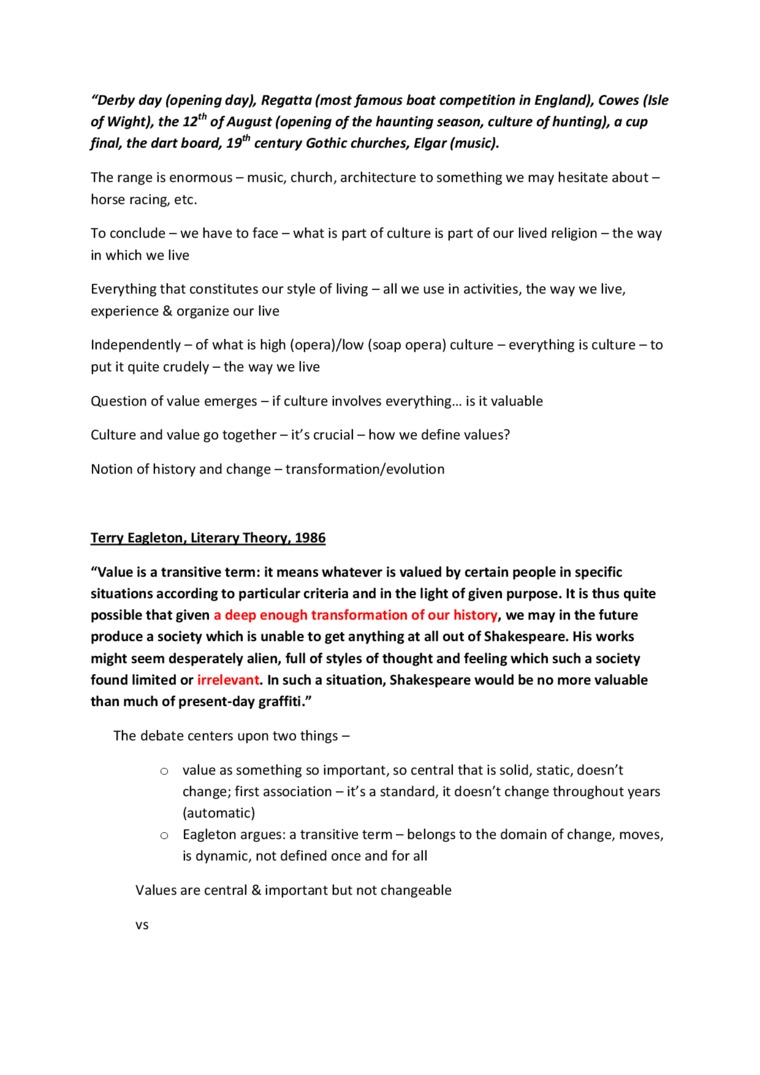14633

"Derby day (opening day), Regatta (most famous boat competition in England), Cowes (Isle of Wight), the 12,h of August (opening of the haunting season, culture ofhunting), a cup finał, the dart board, 19* century Gothic churches, Elgar (musie).
The rangę is enormous - musie, church, architecture to something we may hesitate about -horse racing, etc.
To conclude - we have to face - what is part of culture is part of our lived religion - the way in which we live
Everything that constitutes our style of living - all we use in activities, the way we live, experience & organize our live
Jndependently - of what is high (opera)/low (soap opera) culture - everything is culture - to put it quite crudely - the way we live
Question of value emerges - if culture involves everything... is it valuable Culture and value go together - \ts crucial - how we define values?
Notion of history and change - transformation/evolution
Terry Eagleton. Literary Theory. 1986
"Value is a transitive term: it means whatever is valued by certain people in specific situations according to particular criteria and in the light of given purpose. It is thus quite possible that given a deep enough transformation of our history, we may in the futurę produce a society which is unable to get anything at all out of Shakespeare. His works might seem desperately alien, fuli of styles of thought and feeling which such a society found limited or irrelevant. In such a situation, Shakespeare would be no morę yaluable than much of present-day graffiti."
The debate centers upon two things -
o value as something so important, so central that is solid, static, doesn't change; first association - \ts a standard, it doesn't change throughout years (automatic)
o Eagleton argues: a transitive term - belongs to the domain of change, moves, is dynamie, not defined once and for all
Values are central & important but not changeable vs
Wyszukiwarka
Podobne podstrony:
degree of mysiidsm. Among the guests in the Jameshousehdd were some of the most famous minds of the
29 (30) The Twentyfirst Day ofDecember 2 shurdes. The snowflake is madę in 3 rounds, but do not cut
2(6) The End of a Perfect Day As much as I love lush gardens and quaint cottages, I also love the un
Stop?ting Your Heart Out The! Day Program to Free Yourself from Emotional?ting STOP EATING YOUR HEAR
First carne Chicago Sports Day. on which you could wear lust about anything embla zoned wi
m231$ r The Pont Valentre, built in It is protectcd by three tali ijoS, is the most famous to wers.
The Medieval period in Great Britain (1066-1485) - 1066 - it s the most famous dat
img472 (6) o City tours Bi ( 1 arcelona’s most famous architect, Antoni Gaudf, was bom in 1852. The
1*01 IRY Vt*ronK4 Franco (1546-1591). the most famous courtcsan of Vcnk:e. was a beautiful woman. Sh
22 (43) The Fourteenth Day ofDecember 2 shutdes. This snowflake is madę in 3 rounds, but do not cut
back Religion and Philosophy Perhaps the most famous of all of Alan Watts’s works, The Book del
więcej podobnych podstron